An Analysis of Budgeting and Decision-Making in Management Accounting
VerifiedAdded on 2023/01/07
|8
|1940
|44
Essay
AI Summary
This essay examines the crucial role of budgeting in management accounting, emphasizing its impact on organizational decision-making. It begins by defining management accounting and introducing the concept of budgeting. The main body explores various budgeting methods, including incremental, activity-based, value proposition, and zero-based budgeting, highlighting their unique characteristics and applications. The essay then delves into the role of budgeting in planning, financial control, funding commitments, meeting objectives, and securing funds for future projects. Static and flexible budgets are discussed, including their benefits and drawbacks. The essay also covers participative budgeting, its merits, and demerits. The conclusion reinforces the importance of budgeting in achieving organizational goals and objectives, emphasizing the need for managers to select the right budgetary methods to make informed decisions. The essay uses references to support the arguments made.

Essay
Paraphrase This Document
Need a fresh take? Get an instant paraphrase of this document with our AI Paraphraser
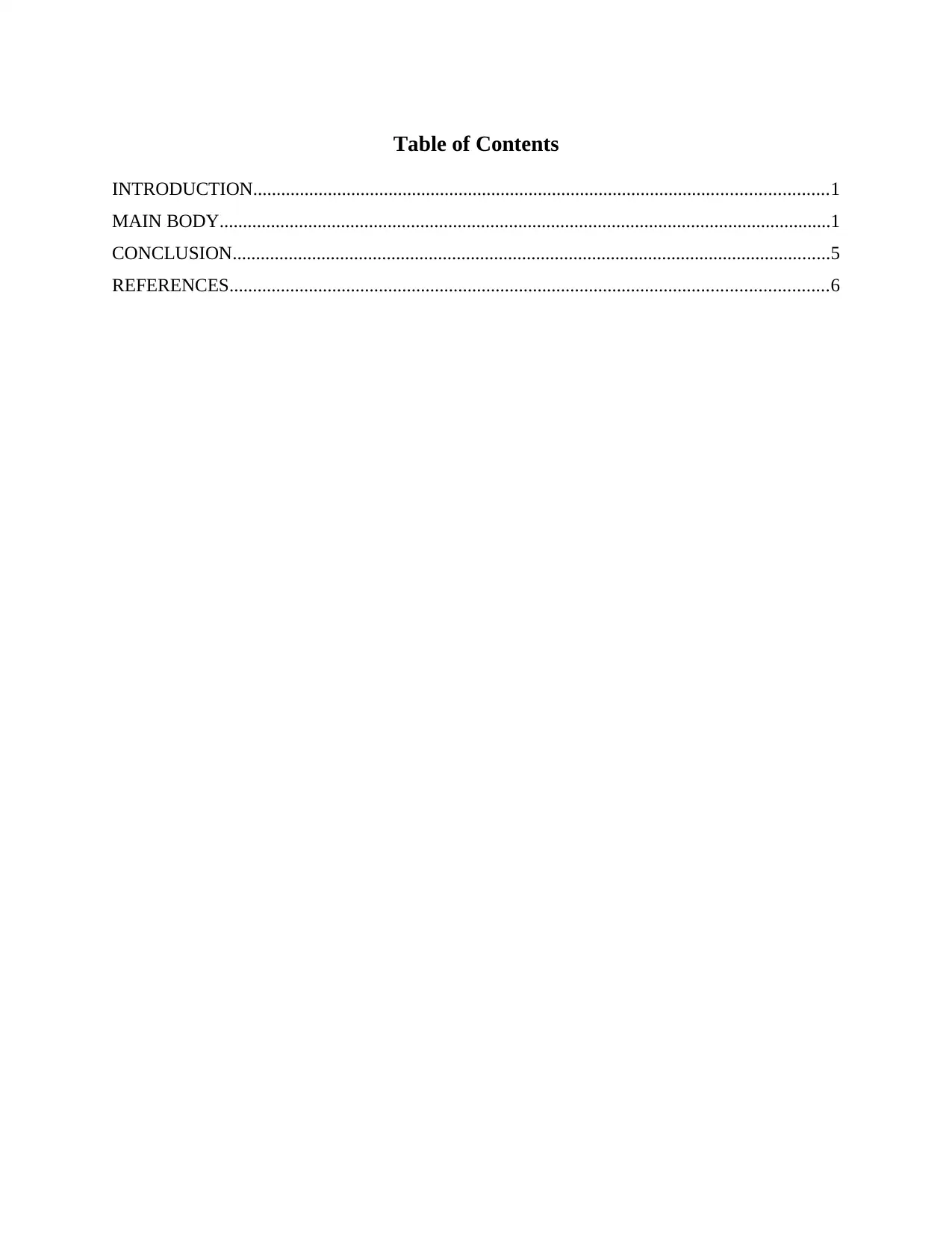
Table of Contents
INTRODUCTION...........................................................................................................................1
MAIN BODY...................................................................................................................................1
CONCLUSION................................................................................................................................5
REFERENCES................................................................................................................................6
INTRODUCTION...........................................................................................................................1
MAIN BODY...................................................................................................................................1
CONCLUSION................................................................................................................................5
REFERENCES................................................................................................................................6
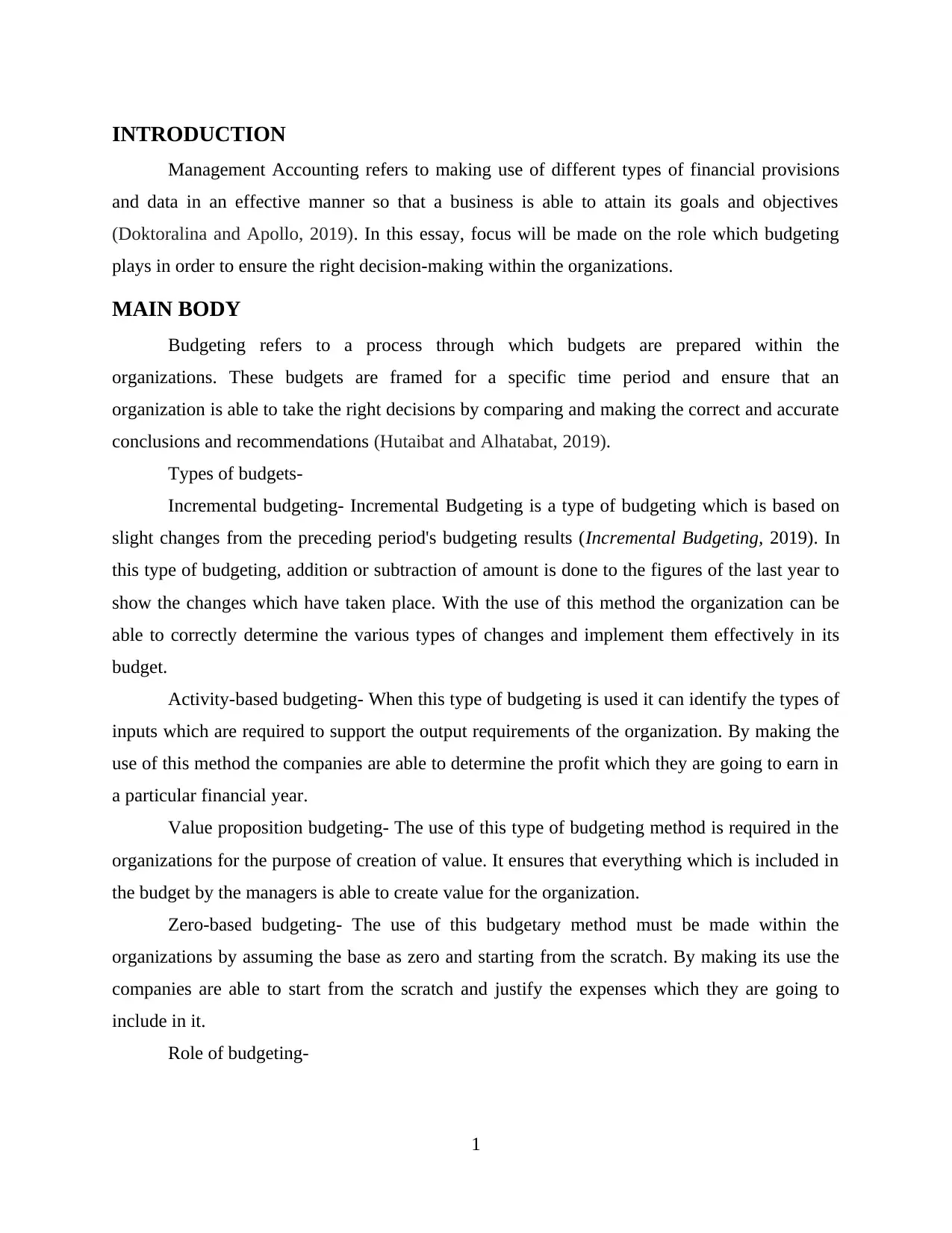
INTRODUCTION
Management Accounting refers to making use of different types of financial provisions
and data in an effective manner so that a business is able to attain its goals and objectives
(Doktoralina and Apollo, 2019). In this essay, focus will be made on the role which budgeting
plays in order to ensure the right decision-making within the organizations.
MAIN BODY
Budgeting refers to a process through which budgets are prepared within the
organizations. These budgets are framed for a specific time period and ensure that an
organization is able to take the right decisions by comparing and making the correct and accurate
conclusions and recommendations (Hutaibat and Alhatabat, 2019).
Types of budgets-
Incremental budgeting- Incremental Budgeting is a type of budgeting which is based on
slight changes from the preceding period's budgeting results (Incremental Budgeting, 2019). In
this type of budgeting, addition or subtraction of amount is done to the figures of the last year to
show the changes which have taken place. With the use of this method the organization can be
able to correctly determine the various types of changes and implement them effectively in its
budget.
Activity-based budgeting- When this type of budgeting is used it can identify the types of
inputs which are required to support the output requirements of the organization. By making the
use of this method the companies are able to determine the profit which they are going to earn in
a particular financial year.
Value proposition budgeting- The use of this type of budgeting method is required in the
organizations for the purpose of creation of value. It ensures that everything which is included in
the budget by the managers is able to create value for the organization.
Zero-based budgeting- The use of this budgetary method must be made within the
organizations by assuming the base as zero and starting from the scratch. By making its use the
companies are able to start from the scratch and justify the expenses which they are going to
include in it.
Role of budgeting-
1
Management Accounting refers to making use of different types of financial provisions
and data in an effective manner so that a business is able to attain its goals and objectives
(Doktoralina and Apollo, 2019). In this essay, focus will be made on the role which budgeting
plays in order to ensure the right decision-making within the organizations.
MAIN BODY
Budgeting refers to a process through which budgets are prepared within the
organizations. These budgets are framed for a specific time period and ensure that an
organization is able to take the right decisions by comparing and making the correct and accurate
conclusions and recommendations (Hutaibat and Alhatabat, 2019).
Types of budgets-
Incremental budgeting- Incremental Budgeting is a type of budgeting which is based on
slight changes from the preceding period's budgeting results (Incremental Budgeting, 2019). In
this type of budgeting, addition or subtraction of amount is done to the figures of the last year to
show the changes which have taken place. With the use of this method the organization can be
able to correctly determine the various types of changes and implement them effectively in its
budget.
Activity-based budgeting- When this type of budgeting is used it can identify the types of
inputs which are required to support the output requirements of the organization. By making the
use of this method the companies are able to determine the profit which they are going to earn in
a particular financial year.
Value proposition budgeting- The use of this type of budgeting method is required in the
organizations for the purpose of creation of value. It ensures that everything which is included in
the budget by the managers is able to create value for the organization.
Zero-based budgeting- The use of this budgetary method must be made within the
organizations by assuming the base as zero and starting from the scratch. By making its use the
companies are able to start from the scratch and justify the expenses which they are going to
include in it.
Role of budgeting-
1
⊘ This is a preview!⊘
Do you want full access?
Subscribe today to unlock all pages.

Trusted by 1+ million students worldwide
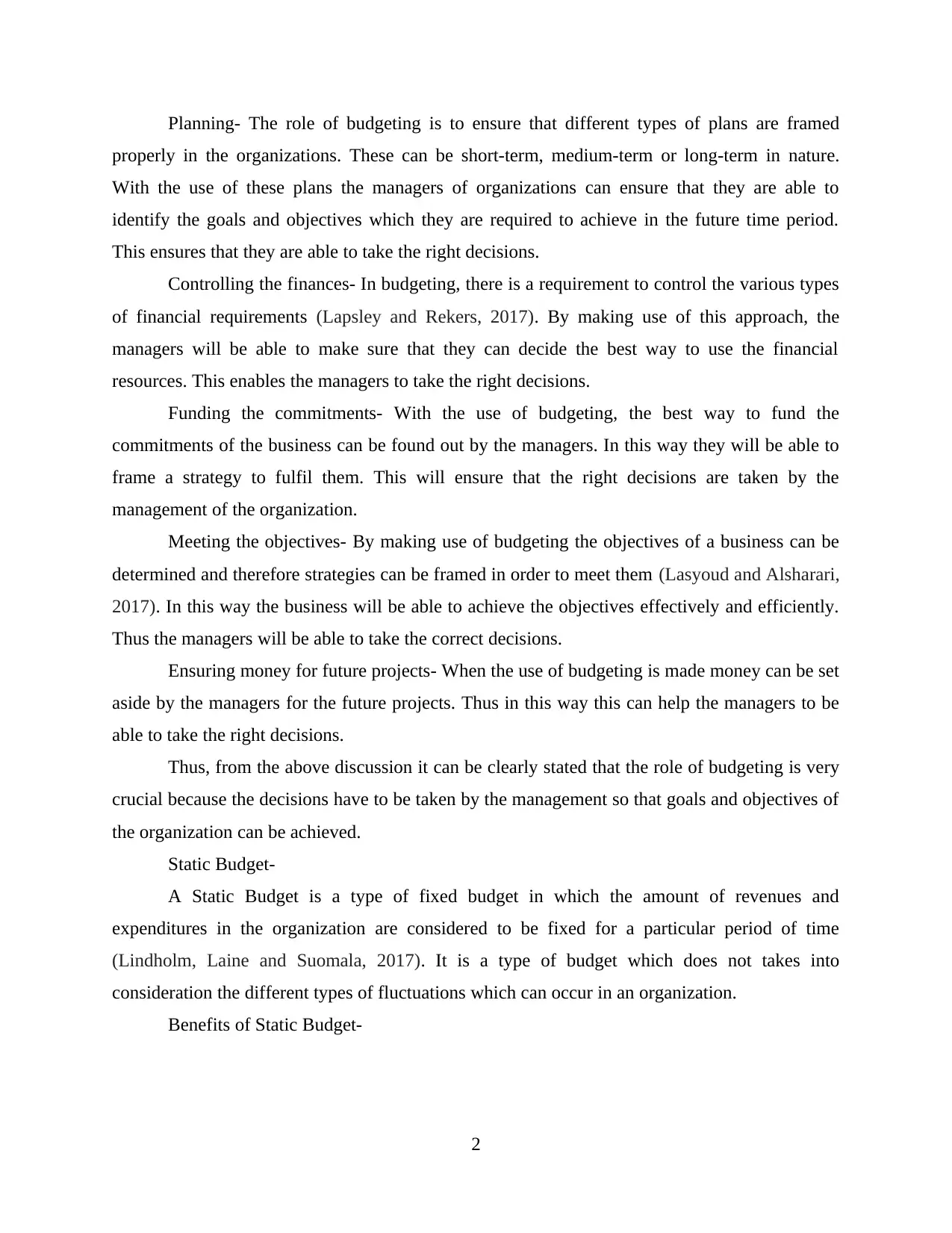
Planning- The role of budgeting is to ensure that different types of plans are framed
properly in the organizations. These can be short-term, medium-term or long-term in nature.
With the use of these plans the managers of organizations can ensure that they are able to
identify the goals and objectives which they are required to achieve in the future time period.
This ensures that they are able to take the right decisions.
Controlling the finances- In budgeting, there is a requirement to control the various types
of financial requirements (Lapsley and Rekers, 2017). By making use of this approach, the
managers will be able to make sure that they can decide the best way to use the financial
resources. This enables the managers to take the right decisions.
Funding the commitments- With the use of budgeting, the best way to fund the
commitments of the business can be found out by the managers. In this way they will be able to
frame a strategy to fulfil them. This will ensure that the right decisions are taken by the
management of the organization.
Meeting the objectives- By making use of budgeting the objectives of a business can be
determined and therefore strategies can be framed in order to meet them (Lasyoud and Alsharari,
2017). In this way the business will be able to achieve the objectives effectively and efficiently.
Thus the managers will be able to take the correct decisions.
Ensuring money for future projects- When the use of budgeting is made money can be set
aside by the managers for the future projects. Thus in this way this can help the managers to be
able to take the right decisions.
Thus, from the above discussion it can be clearly stated that the role of budgeting is very
crucial because the decisions have to be taken by the management so that goals and objectives of
the organization can be achieved.
Static Budget-
A Static Budget is a type of fixed budget in which the amount of revenues and
expenditures in the organization are considered to be fixed for a particular period of time
(Lindholm, Laine and Suomala, 2017). It is a type of budget which does not takes into
consideration the different types of fluctuations which can occur in an organization.
Benefits of Static Budget-
2
properly in the organizations. These can be short-term, medium-term or long-term in nature.
With the use of these plans the managers of organizations can ensure that they are able to
identify the goals and objectives which they are required to achieve in the future time period.
This ensures that they are able to take the right decisions.
Controlling the finances- In budgeting, there is a requirement to control the various types
of financial requirements (Lapsley and Rekers, 2017). By making use of this approach, the
managers will be able to make sure that they can decide the best way to use the financial
resources. This enables the managers to take the right decisions.
Funding the commitments- With the use of budgeting, the best way to fund the
commitments of the business can be found out by the managers. In this way they will be able to
frame a strategy to fulfil them. This will ensure that the right decisions are taken by the
management of the organization.
Meeting the objectives- By making use of budgeting the objectives of a business can be
determined and therefore strategies can be framed in order to meet them (Lasyoud and Alsharari,
2017). In this way the business will be able to achieve the objectives effectively and efficiently.
Thus the managers will be able to take the correct decisions.
Ensuring money for future projects- When the use of budgeting is made money can be set
aside by the managers for the future projects. Thus in this way this can help the managers to be
able to take the right decisions.
Thus, from the above discussion it can be clearly stated that the role of budgeting is very
crucial because the decisions have to be taken by the management so that goals and objectives of
the organization can be achieved.
Static Budget-
A Static Budget is a type of fixed budget in which the amount of revenues and
expenditures in the organization are considered to be fixed for a particular period of time
(Lindholm, Laine and Suomala, 2017). It is a type of budget which does not takes into
consideration the different types of fluctuations which can occur in an organization.
Benefits of Static Budget-
2
Paraphrase This Document
Need a fresh take? Get an instant paraphrase of this document with our AI Paraphraser
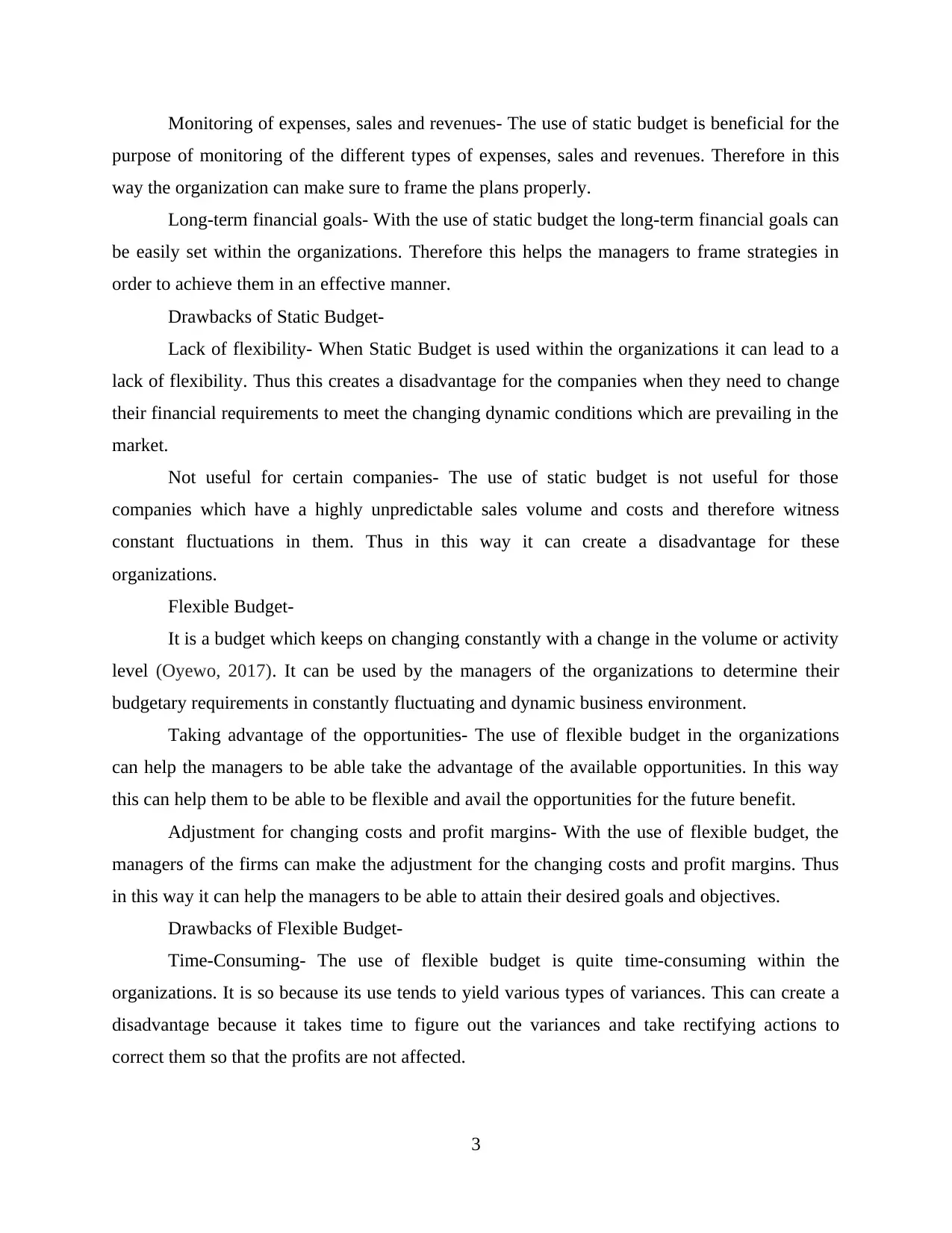
Monitoring of expenses, sales and revenues- The use of static budget is beneficial for the
purpose of monitoring of the different types of expenses, sales and revenues. Therefore in this
way the organization can make sure to frame the plans properly.
Long-term financial goals- With the use of static budget the long-term financial goals can
be easily set within the organizations. Therefore this helps the managers to frame strategies in
order to achieve them in an effective manner.
Drawbacks of Static Budget-
Lack of flexibility- When Static Budget is used within the organizations it can lead to a
lack of flexibility. Thus this creates a disadvantage for the companies when they need to change
their financial requirements to meet the changing dynamic conditions which are prevailing in the
market.
Not useful for certain companies- The use of static budget is not useful for those
companies which have a highly unpredictable sales volume and costs and therefore witness
constant fluctuations in them. Thus in this way it can create a disadvantage for these
organizations.
Flexible Budget-
It is a budget which keeps on changing constantly with a change in the volume or activity
level (Oyewo, 2017). It can be used by the managers of the organizations to determine their
budgetary requirements in constantly fluctuating and dynamic business environment.
Taking advantage of the opportunities- The use of flexible budget in the organizations
can help the managers to be able take the advantage of the available opportunities. In this way
this can help them to be able to be flexible and avail the opportunities for the future benefit.
Adjustment for changing costs and profit margins- With the use of flexible budget, the
managers of the firms can make the adjustment for the changing costs and profit margins. Thus
in this way it can help the managers to be able to attain their desired goals and objectives.
Drawbacks of Flexible Budget-
Time-Consuming- The use of flexible budget is quite time-consuming within the
organizations. It is so because its use tends to yield various types of variances. This can create a
disadvantage because it takes time to figure out the variances and take rectifying actions to
correct them so that the profits are not affected.
3
purpose of monitoring of the different types of expenses, sales and revenues. Therefore in this
way the organization can make sure to frame the plans properly.
Long-term financial goals- With the use of static budget the long-term financial goals can
be easily set within the organizations. Therefore this helps the managers to frame strategies in
order to achieve them in an effective manner.
Drawbacks of Static Budget-
Lack of flexibility- When Static Budget is used within the organizations it can lead to a
lack of flexibility. Thus this creates a disadvantage for the companies when they need to change
their financial requirements to meet the changing dynamic conditions which are prevailing in the
market.
Not useful for certain companies- The use of static budget is not useful for those
companies which have a highly unpredictable sales volume and costs and therefore witness
constant fluctuations in them. Thus in this way it can create a disadvantage for these
organizations.
Flexible Budget-
It is a budget which keeps on changing constantly with a change in the volume or activity
level (Oyewo, 2017). It can be used by the managers of the organizations to determine their
budgetary requirements in constantly fluctuating and dynamic business environment.
Taking advantage of the opportunities- The use of flexible budget in the organizations
can help the managers to be able take the advantage of the available opportunities. In this way
this can help them to be able to be flexible and avail the opportunities for the future benefit.
Adjustment for changing costs and profit margins- With the use of flexible budget, the
managers of the firms can make the adjustment for the changing costs and profit margins. Thus
in this way it can help the managers to be able to attain their desired goals and objectives.
Drawbacks of Flexible Budget-
Time-Consuming- The use of flexible budget is quite time-consuming within the
organizations. It is so because its use tends to yield various types of variances. This can create a
disadvantage because it takes time to figure out the variances and take rectifying actions to
correct them so that the profits are not affected.
3
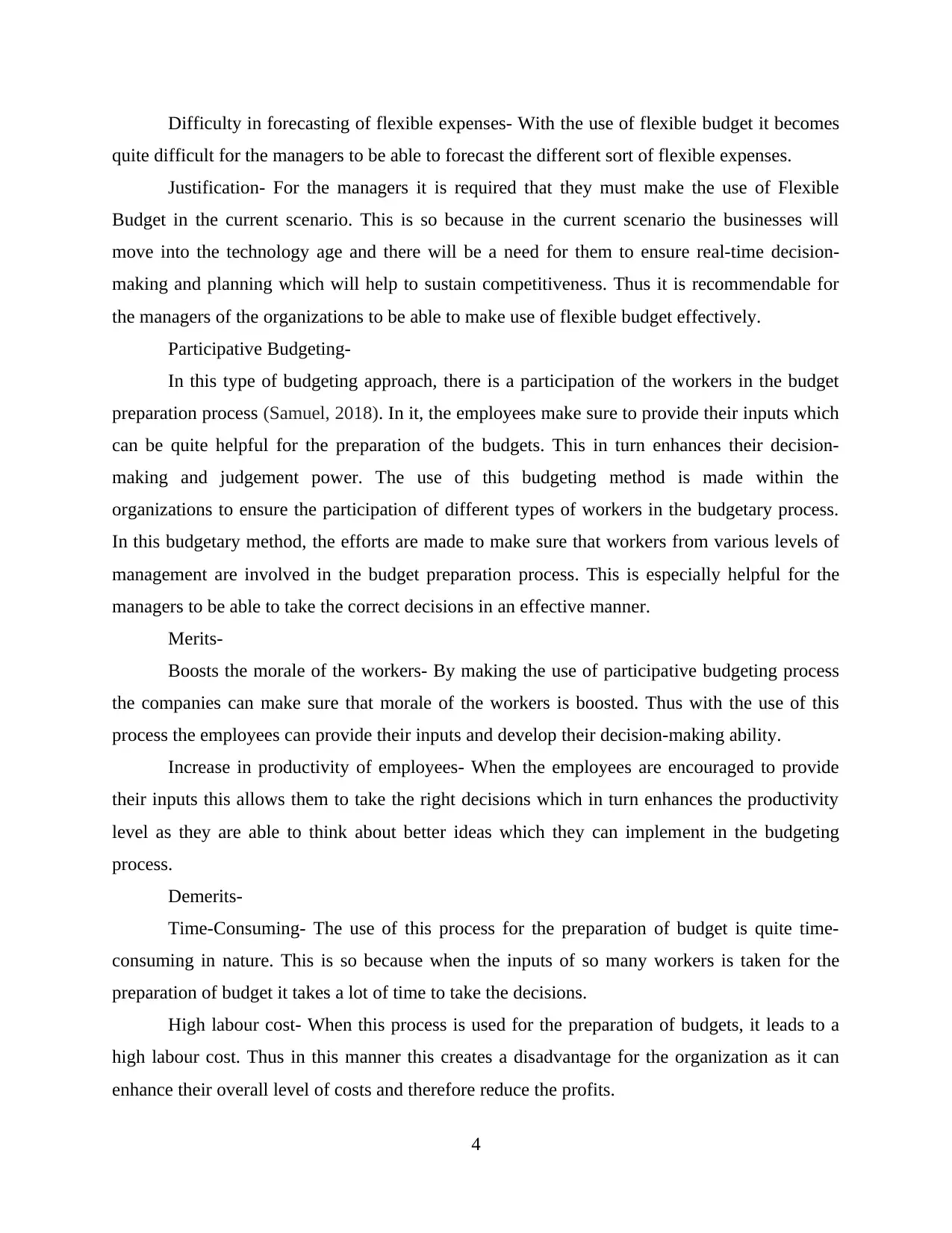
Difficulty in forecasting of flexible expenses- With the use of flexible budget it becomes
quite difficult for the managers to be able to forecast the different sort of flexible expenses.
Justification- For the managers it is required that they must make the use of Flexible
Budget in the current scenario. This is so because in the current scenario the businesses will
move into the technology age and there will be a need for them to ensure real-time decision-
making and planning which will help to sustain competitiveness. Thus it is recommendable for
the managers of the organizations to be able to make use of flexible budget effectively.
Participative Budgeting-
In this type of budgeting approach, there is a participation of the workers in the budget
preparation process (Samuel, 2018). In it, the employees make sure to provide their inputs which
can be quite helpful for the preparation of the budgets. This in turn enhances their decision-
making and judgement power. The use of this budgeting method is made within the
organizations to ensure the participation of different types of workers in the budgetary process.
In this budgetary method, the efforts are made to make sure that workers from various levels of
management are involved in the budget preparation process. This is especially helpful for the
managers to be able to take the correct decisions in an effective manner.
Merits-
Boosts the morale of the workers- By making the use of participative budgeting process
the companies can make sure that morale of the workers is boosted. Thus with the use of this
process the employees can provide their inputs and develop their decision-making ability.
Increase in productivity of employees- When the employees are encouraged to provide
their inputs this allows them to take the right decisions which in turn enhances the productivity
level as they are able to think about better ideas which they can implement in the budgeting
process.
Demerits-
Time-Consuming- The use of this process for the preparation of budget is quite time-
consuming in nature. This is so because when the inputs of so many workers is taken for the
preparation of budget it takes a lot of time to take the decisions.
High labour cost- When this process is used for the preparation of budgets, it leads to a
high labour cost. Thus in this manner this creates a disadvantage for the organization as it can
enhance their overall level of costs and therefore reduce the profits.
4
quite difficult for the managers to be able to forecast the different sort of flexible expenses.
Justification- For the managers it is required that they must make the use of Flexible
Budget in the current scenario. This is so because in the current scenario the businesses will
move into the technology age and there will be a need for them to ensure real-time decision-
making and planning which will help to sustain competitiveness. Thus it is recommendable for
the managers of the organizations to be able to make use of flexible budget effectively.
Participative Budgeting-
In this type of budgeting approach, there is a participation of the workers in the budget
preparation process (Samuel, 2018). In it, the employees make sure to provide their inputs which
can be quite helpful for the preparation of the budgets. This in turn enhances their decision-
making and judgement power. The use of this budgeting method is made within the
organizations to ensure the participation of different types of workers in the budgetary process.
In this budgetary method, the efforts are made to make sure that workers from various levels of
management are involved in the budget preparation process. This is especially helpful for the
managers to be able to take the correct decisions in an effective manner.
Merits-
Boosts the morale of the workers- By making the use of participative budgeting process
the companies can make sure that morale of the workers is boosted. Thus with the use of this
process the employees can provide their inputs and develop their decision-making ability.
Increase in productivity of employees- When the employees are encouraged to provide
their inputs this allows them to take the right decisions which in turn enhances the productivity
level as they are able to think about better ideas which they can implement in the budgeting
process.
Demerits-
Time-Consuming- The use of this process for the preparation of budget is quite time-
consuming in nature. This is so because when the inputs of so many workers is taken for the
preparation of budget it takes a lot of time to take the decisions.
High labour cost- When this process is used for the preparation of budgets, it leads to a
high labour cost. Thus in this manner this creates a disadvantage for the organization as it can
enhance their overall level of costs and therefore reduce the profits.
4
⊘ This is a preview!⊘
Do you want full access?
Subscribe today to unlock all pages.

Trusted by 1+ million students worldwide
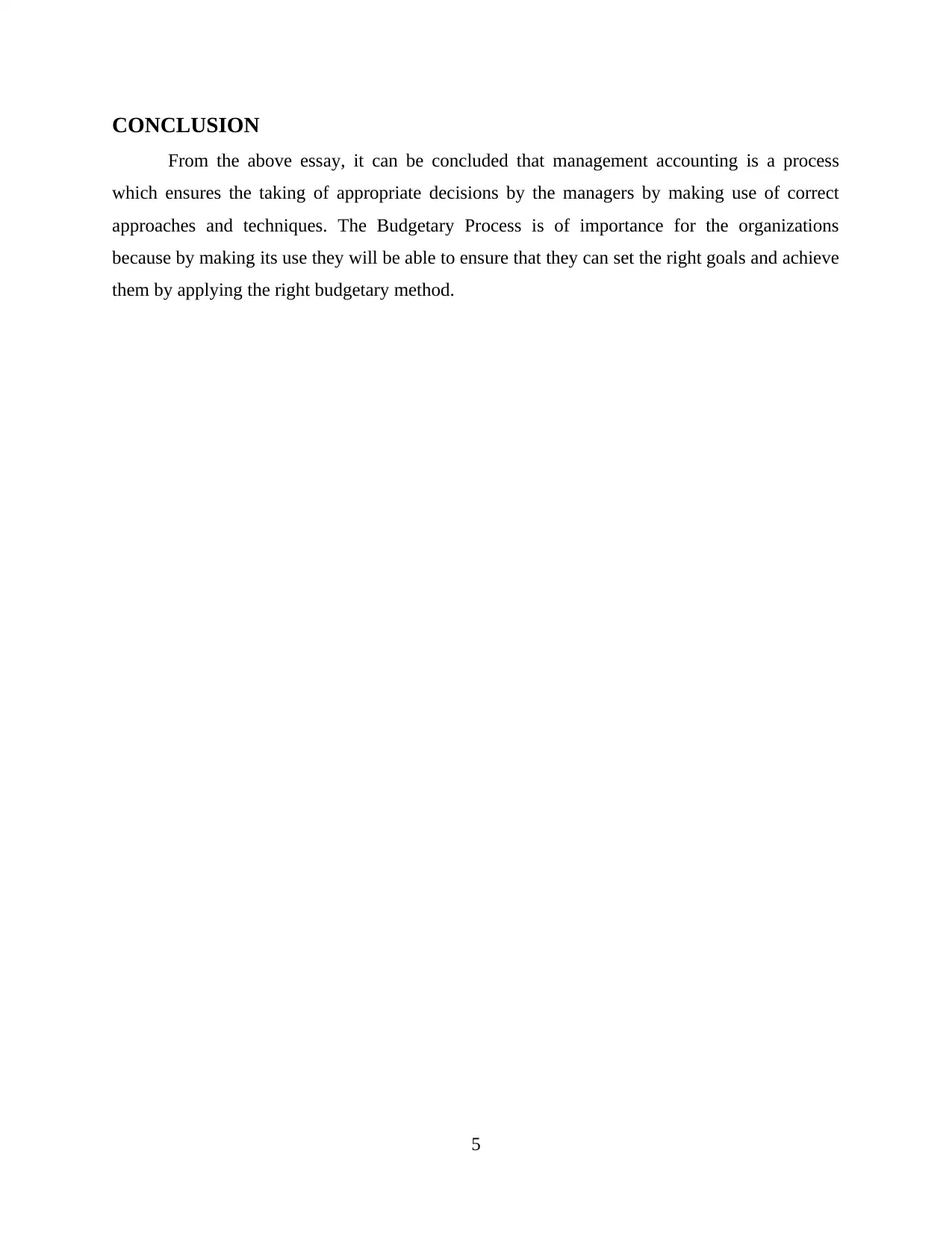
CONCLUSION
From the above essay, it can be concluded that management accounting is a process
which ensures the taking of appropriate decisions by the managers by making use of correct
approaches and techniques. The Budgetary Process is of importance for the organizations
because by making its use they will be able to ensure that they can set the right goals and achieve
them by applying the right budgetary method.
5
From the above essay, it can be concluded that management accounting is a process
which ensures the taking of appropriate decisions by the managers by making use of correct
approaches and techniques. The Budgetary Process is of importance for the organizations
because by making its use they will be able to ensure that they can set the right goals and achieve
them by applying the right budgetary method.
5
Paraphrase This Document
Need a fresh take? Get an instant paraphrase of this document with our AI Paraphraser
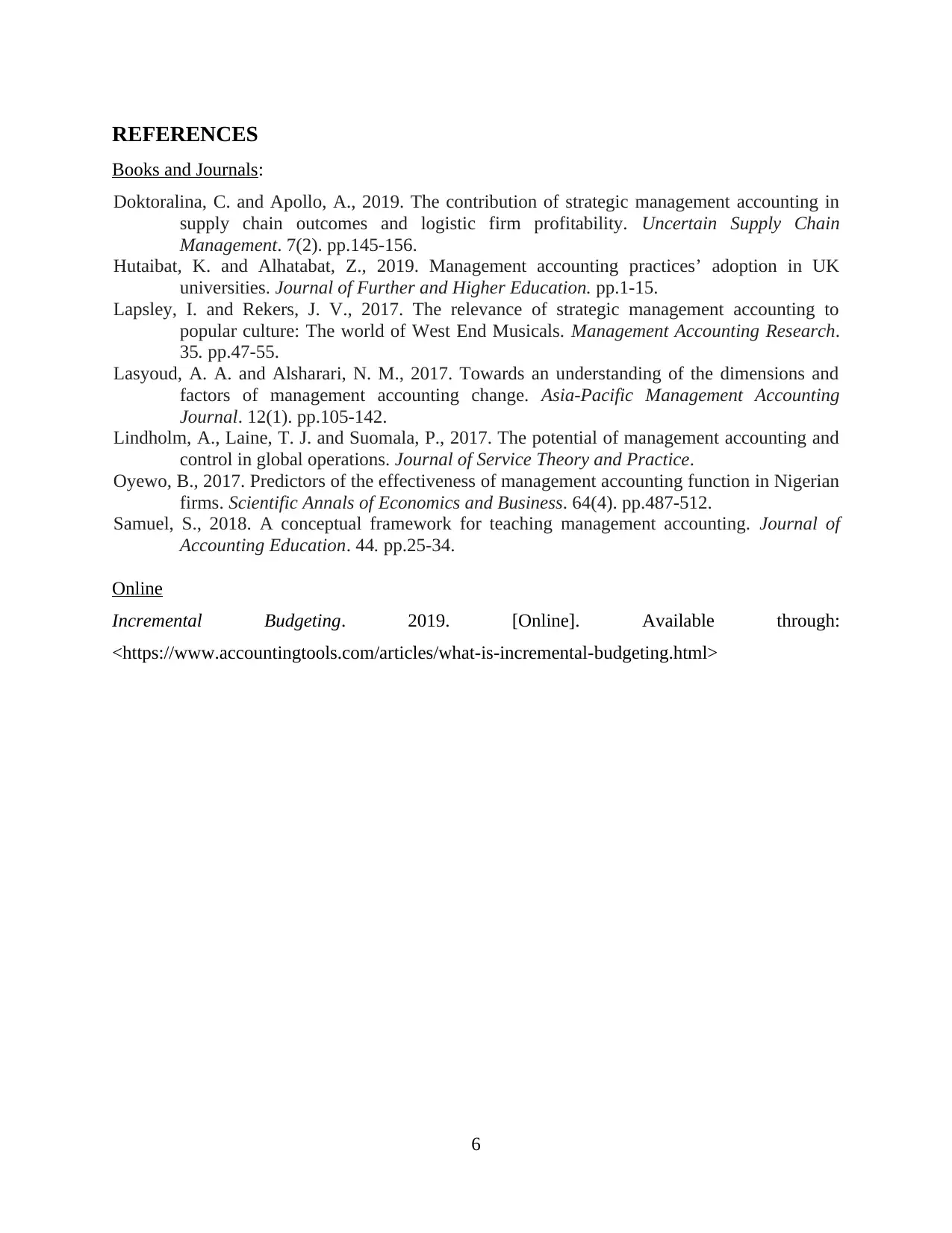
REFERENCES
Books and Journals:
Doktoralina, C. and Apollo, A., 2019. The contribution of strategic management accounting in
supply chain outcomes and logistic firm profitability. Uncertain Supply Chain
Management. 7(2). pp.145-156.
Hutaibat, K. and Alhatabat, Z., 2019. Management accounting practices’ adoption in UK
universities. Journal of Further and Higher Education. pp.1-15.
Lapsley, I. and Rekers, J. V., 2017. The relevance of strategic management accounting to
popular culture: The world of West End Musicals. Management Accounting Research.
35. pp.47-55.
Lasyoud, A. A. and Alsharari, N. M., 2017. Towards an understanding of the dimensions and
factors of management accounting change. Asia-Pacific Management Accounting
Journal. 12(1). pp.105-142.
Lindholm, A., Laine, T. J. and Suomala, P., 2017. The potential of management accounting and
control in global operations. Journal of Service Theory and Practice.
Oyewo, B., 2017. Predictors of the effectiveness of management accounting function in Nigerian
firms. Scientific Annals of Economics and Business. 64(4). pp.487-512.
Samuel, S., 2018. A conceptual framework for teaching management accounting. Journal of
Accounting Education. 44. pp.25-34.
Online
Incremental Budgeting. 2019. [Online]. Available through:
<https://www.accountingtools.com/articles/what-is-incremental-budgeting.html>
6
Books and Journals:
Doktoralina, C. and Apollo, A., 2019. The contribution of strategic management accounting in
supply chain outcomes and logistic firm profitability. Uncertain Supply Chain
Management. 7(2). pp.145-156.
Hutaibat, K. and Alhatabat, Z., 2019. Management accounting practices’ adoption in UK
universities. Journal of Further and Higher Education. pp.1-15.
Lapsley, I. and Rekers, J. V., 2017. The relevance of strategic management accounting to
popular culture: The world of West End Musicals. Management Accounting Research.
35. pp.47-55.
Lasyoud, A. A. and Alsharari, N. M., 2017. Towards an understanding of the dimensions and
factors of management accounting change. Asia-Pacific Management Accounting
Journal. 12(1). pp.105-142.
Lindholm, A., Laine, T. J. and Suomala, P., 2017. The potential of management accounting and
control in global operations. Journal of Service Theory and Practice.
Oyewo, B., 2017. Predictors of the effectiveness of management accounting function in Nigerian
firms. Scientific Annals of Economics and Business. 64(4). pp.487-512.
Samuel, S., 2018. A conceptual framework for teaching management accounting. Journal of
Accounting Education. 44. pp.25-34.
Online
Incremental Budgeting. 2019. [Online]. Available through:
<https://www.accountingtools.com/articles/what-is-incremental-budgeting.html>
6
1 out of 8
Related Documents
Your All-in-One AI-Powered Toolkit for Academic Success.
+13062052269
info@desklib.com
Available 24*7 on WhatsApp / Email
![[object Object]](/_next/static/media/star-bottom.7253800d.svg)
Unlock your academic potential
Copyright © 2020–2026 A2Z Services. All Rights Reserved. Developed and managed by ZUCOL.





